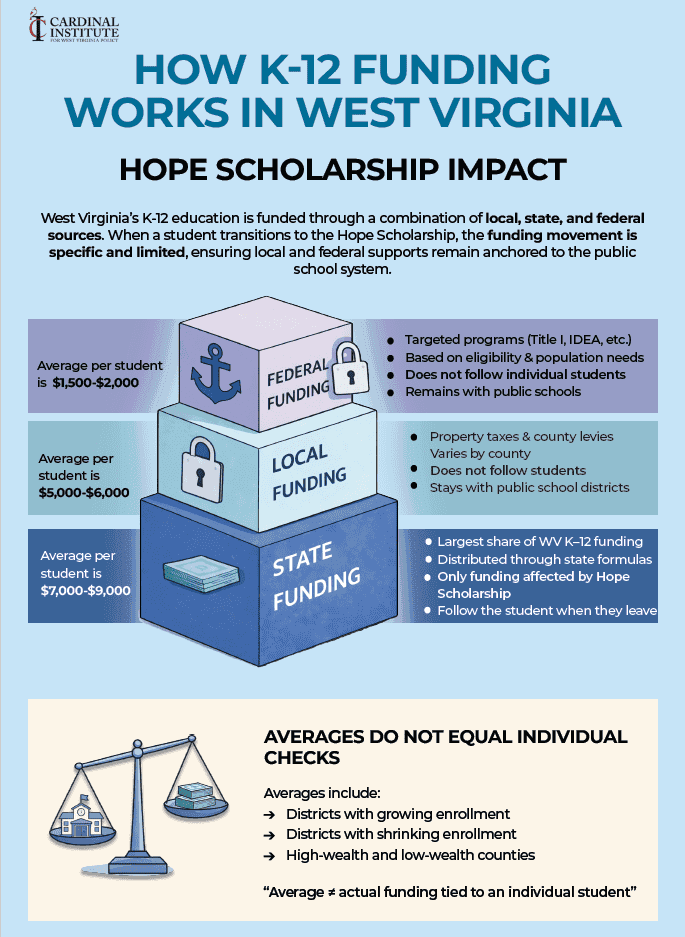
Amendment 4: What You Need to Know
Cardinal Team
Amendment 4: Education Accountability Amendment
On November 8th, 2022, West Virginians will head to the polls to vote for their members of the US House of Representatives and the State Legislature. Nestled under the legislative races are four amendments to the West Virginia Constitution. One of these is Amendment No. 4: Education Accountability Amendment. The Education Accountability Amendment places the West Virginia Board of Education’s rules and regulations under legislative approval.
Legislative Background
On January 13th, 2022, State Rep. Paul Espinosa (R – Jefferson, 66) introduced House Joint Resolution 102, Amendment No. 4. During the legislative proceedings, HJ Res 102 was cosponsored by 10 other delegates and endorsed by Education Committee Chairwoman Senator Patricia Rucker (R – Jefferson, 16). The Legislature passed the amendment on March 4, 2022. Amendment No. 4, is the final constitutional amendment to be placed on the 2022 General Election ballot and is numbered 4 for that reason. This amendment was previously introduced in 2021. However, it died in the State Senate.
Legislators designed Amendment No. 4 to bring the Board of Education’s rulemaking under legislative review. Article XII Section 2 of the West Virginia Constitution says, “the general supervision of the free schools of the State shall be vested in the West Virginia Board of Education, which shall perform such duties as may be prescribed by law.” The West Virginia Supreme Court has previously held, in West Virginia Board of Education v. Nicholas County Board of Education, that
“[r]ule-making by the State Board of Education is within the meaning of ‘general supervision’ of state schools pursuant to art. XII, § 2 of the West Virginia Constitution, and any statutory provision that interferes with such rule[1]making is unconstitutional[.]”
The Legislature introduced Amendment No. 4 to ensure that the Board of Education’s rules and policies have legislative oversight.
Arguments in Support of Amendment 4
Proponents are unified in their belief that this amendment will help place a further check on the state government. Senator Charles Trump (R – Morgan, 15), the Chairman of the Senate Judiciary Committee, said, “The laws and rules under which we have to live in a free society must be crafted ultimately by people who are accountable to the citizens of our state through our elections.”
Senator Rucker, the Chairwoman of the Senate Education Committee echoed this sentiment by saying that, “it [Amendment No. 4] is actually making certain for those who elected us that we are overseeing and holding accountable, and that the laws that we do pass do get applied correctly.”
Even some lawmakers, who were unsure how they would vote as private citizens, supported allowing this amendment to be voted on by the people. One of these was Senator Amy Grady (R-Mason), whose constituents overwhelmingly support the Amendment.
Arguments in Opposition to Amendment 4
Opponents of Amendment No. 4 are less unified in their opposition. Their arguments range from a potential disruption in education standards to concerns of politicization. Senator Mike Romano (D-Harrison) said, “I mean look at us. I mean, we can’t agree on a lot, but when we do agree, sometimes it changes from year to year. What’s that going to do to public education in this state?” This argument echoed former Board of Education President Miller Hall’s concern, during the 2021 debate, about the disruption of public education standards.
In addition to the concern about disruption in public education standards, President Hall also expressed concern about further politicization of the classroom. He said right before the passage of the amendment, “To add another layer of politics [Legislative Approval], I don’t think it’s good; I don’t think that’s a good move.” This view is also shared by the West Virginia Democrat Party, which announced their opposition on August 27th.
Conclusion
The General Election is two months away. As West Virginians prepare to go to the ballot, it is imperative that they carefully consider each measure they are voting on. To learn more about the Constitutional Amendments you can visit the West Virginia Secretary of State’s Website.
Andrew Bambrick is the Education Outreach Coordinator for the Cardinal Institute for West Virginia Policy.







